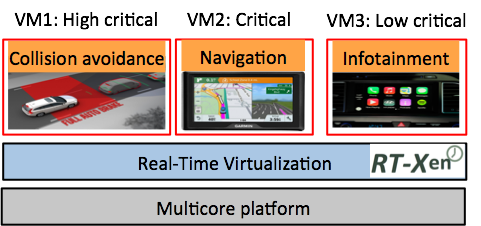Developing Real-Time Virtualization
 Recent years have witnessed two major trends in the development of complex real-time systems. First, they are moving from physically isolated hosts towards common computing platforms shared by multiple systems. Using common platforms can bring significant benefits, including reduced cost and weight, as well as increased flexibility via dynamic resource allocation. For example, the automotive and avionics industries are adopting integrated computing platforms through standardized open architectures, such as AUTOSAR and ARINC. Second, instead of developing systems from scratch, the current trend in building complex real-time systems is to integrate them from other independently developed systems. The integration of systems, however, on common computing platforms brings significant challenges in simultaneously meeting the real-time performance requirements of multiple systems sharing a platform. Meeting these challenges require fundamental new breakthroughs in both platform and resource-management technologies for real-time systems.
Recent years have witnessed two major trends in the development of complex real-time systems. First, they are moving from physically isolated hosts towards common computing platforms shared by multiple systems. Using common platforms can bring significant benefits, including reduced cost and weight, as well as increased flexibility via dynamic resource allocation. For example, the automotive and avionics industries are adopting integrated computing platforms through standardized open architectures, such as AUTOSAR and ARINC. Second, instead of developing systems from scratch, the current trend in building complex real-time systems is to integrate them from other independently developed systems. The integration of systems, however, on common computing platforms brings significant challenges in simultaneously meeting the real-time performance requirements of multiple systems sharing a platform. Meeting these challenges require fundamental new breakthroughs in both platform and resource-management technologies for real-time systems.
We have developed the real-time virtualization platform (RT-Xen) to support the real-time performance of tasks in virtual machines (VMs) atop multicore platforms. The platform manages shared hardware resources, such as CPU and cache, in real-time manner to guarantee each VM always gets its configured resources. One of the developed schedulers has been adopted in industry and has become the RTDS scheduler in Xen, the famous open-source virtualization software that powers many commercial clouds.
We have also proposed the compositional real-time scheduling analysis theory to support modern component-based design and analysis of real-time systems. Our theory enables system designers to independently analyze how much resource should be configured to each VM such that tasks’ real-time performance can be achieved. We have developed CARTS (Compositional Analysis of Real-Time Systems) as a platform-independent tool for system designers to perform the analysis.
For more information on this and other cyber-physical systems projects, see the PRECISE Center.
Faculty
Students and Postdocs
- Meng Xu (PhD)
- Hyon Young Choi (postdoc)
- Jin Hyun Kim (posdoc)
Funding
Sponsored by grants from ONR, NSF, DGIST, Toyota
Collaborators
Washington University in St Louis
